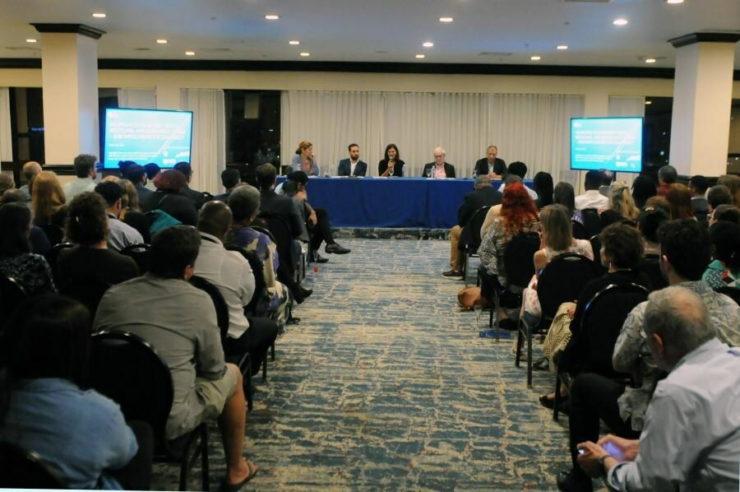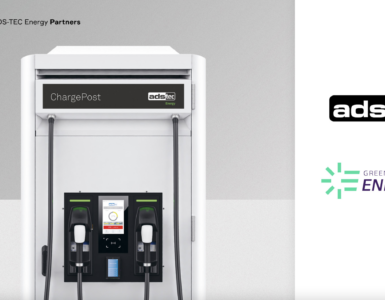Next Gen Batteries and Dubious Economics Are Reshaping the Deep Sea Mining Debate.
From March 18-28, states from around the world have flown into Kingston, Jamaica for the International Seabed Authority’s 29th Session from March 18-28 to discuss the future of the deep sea and deep-sea mining. A special event on March 25, hosted by the Blue Climate Initiative, attended by 25 different country delegations, brought key voices to Kingston to address how the next generation of electric vehicle (EV) batteries and the dubious economics of deep-sea mining (DSM) are reshaping the debate over this controversial industry.
At the event, speakers addressed how technology, EV battery trends, recycling and growing questions about the economic viability of deep-sea mining are changing the landscape, and the impact of these developments on the decisions that ISA delegates need to make. The facts shared presented the latest major issues the potential industry would need to overcome, on top of the environmental damage and regulatory difficulties associated with DSM.
Dan Kammen, Professor of Renewable Energy at the University of California, Berkeley, noted that next generation EV batteries that don’t use deep-sea metals have rapidly gained market share and now represent over 50% of today’s global battery production. He said these new batteries have undercut the argument that we need to rush to mine the sea:
🔥 What about we co-host a webinar? Let's educate, captivate, and convert the battery economy!
Batteries News is the global go-to online magazine for the battery industry, we can help you host impactful webinars that become a global reference on your topic and are an evergreen source of leads. Click here to request more details
Dan Kammen, Professor of Renewable Energy at the University of California, said:
Deep seabed mining is fool’s gold and profiteering by the few.
“These profiteers are posing as ‘saviors’ of people in mining areas on land, when better mining practices, smart materials choices, and recycling could more than provide the materials they want to strip-mine from the least well-understood ecosystem on the planet: the abyssal seabed floor.”
Michael Norton, Environment Director for the European Academies Science Advisory Council, discussed how new scientific discoveries are affecting the decisions that policymakers need to make. He noted:
The science on DSM has exploded in the last few years and all of it argues that we should get our own terrestrial house in order through better recycling and mining rules rather than just move onto the next environmental frontier to destroy.
Bobbi-Jo Dobush of The Ocean Foundation, said that the business case for deep-sea mining simply does not add up. She noted that high costs, technical challenges, financial developments since 2021 and new innovations have undermined the potential for profits, raising serious questions about the ability of mining companies to remediate environmental damage or provide any return to sponsoring states. She noted:
When it comes to deep-sea mining, investors should undertake robust due diligence. DSM is an unproven industrial endeavor fraught with technical, financial, and regulatory uncertainty.
“More so, the industry faces strong Indigenous opposition and human rights concerns. All of these factors add up to substantial potential financial and legal risks for both public and private investors as well as states considering sponsoring seabed mining.”
Jeanne Everett from the Blue Climate Initiative added:
Whether a mining venture is profitable is critical to the question of whether a mining company will be able to fulfill critical commitments to remediate environmental harm and provide benefits to sponsoring states.
“Because of the implications of financial insolvency for everyone involved, before licenses are granted to private companies to mine and exploit property belonging to all humankind, policy makers need to be assured that a mining venture will be financially successful and able to fulfill its commitments to everyone and every Place.”
Martin Webeler, Ocean Campaigner and Researcher with the Environmental Justice Foundation discussed some of the misleading claims by those seeking to profit from deep-sea mining and how recent developments in recycling and circular economy programs are affecting the need for DSM. He said:
Deep-sea mining will neither contribute to solving climate change nor will it stop the extinction of species.
“The answer to preserving a planet worth living on lies not in the destruction of new habitats but in a circular economic system and the reduction of demand combined with less mineral-intensive green energy technologies. We must embark on this path immediately if we want to preserve a healthy planet.”
As pointed out after the event by many of the 90-person audience members, it was the first time that such considerations related to changing battery technology trends and their potential implications on DSM policy, were extensively covered on the ground in Kingston.
To date, twenty-five countries, hundreds of scientists and environmentalists, over seventy different indigenous groups, and hundreds of thousands of individuals from around the world have called for a moratorium on deep sea mining to avoid a potential environmental disaster.
More information about the issues discussed at the event can be found in the following papers that the speakers co-authored or participated in preparing and consolidated in the event’s brief :
“Next Generation EV Batteries Eliminate the Need for Deep Sea Mining” – available on the Blue Climate Initiative website.
“Deep-Sea Mining: Assessing Evidence on Future Needs and Environmental Impact” – available on the European Academies Science Advisory Council website.
“Deep Sea Mining Isn’t Worth the Risk: High Costs, Financial Developments Since 2021, and Externalities Stand to Diminish Theoretical Returns on Investment” – available on The Ocean Foundation website.
“Critical Minerals and the Green Transition: Do We Need to Mine the Deep Seas?” – available on the Environmental Justice Foundation (EJF) website.
“How to Loose Half a Trillion Deep sea mining to destroy at least half a trillion dollars in corporate value and natural capital” – available on the Planet Tracker website.
The event was hosted by the Blue Climate Initiative, The Ocean Foundation, the Sustainable Ocean Alliance, and the Deep Sea Conservation Coalition.
The Blue Climate Initiative identifies, implements, and accelerates ocean-related solutions to climate change in support of the United Nations Sustainable Development Goals. For more information, visit www.blueclimateinitiative.org.
READ the latest Batteries News shaping the battery market
Next Gen Batteries and Dubious Economics Are Reshaping the Deep Sea Mining Debate. source








